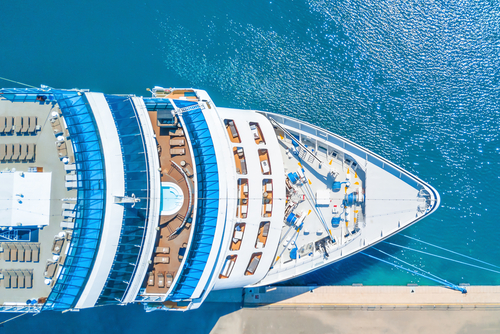Cruise Lines International Association (CLIA) released the results of its 2022 Global Cruise Industry Environmental Technologies and Practices Report, showing progress towards achieving the industry’s vision of net-zero carbon cruising globally by 2050.
The 2022 report reinforces the cruise industry’s credentials as an innovator and early adopter of environmental technologies. Examples cited include the increasing number of vessels launching over the new few years that will be able to incorporate zero-emissions propulsion when available as well as the growing investment to equip ships to plug in to shoreside electricity where available.
In fact, more than 15% of the vessels to be launched in the next five years will be equipped to incorporate fuel cells or batteries, and 85% of CLIA-member ships coming online between now and 2028 will be able to plug in to shoreside electricity, allowing engines to switch off at berth for significant emissions reduction.
The cruise industry continues to lead the way by investing billions to incorporate new technologies, accelerate development of sustainable marine fuels – in particular, engines capable of using sustainable marine fuels – and enable shoreside electricity connectivity on existing and new ships
President, and CEO, CLIA, Kelly Craighead said.
Despite progress made, the report makes clear that a transition to sustainable marine fuels remains essential to achieving the maritime industry’s decarbonization goals and underscores the urgent need for governments to support research efforts to accelerate development of these fuels so that they are safe, viable and available for use at scale.
To that end, CLIA is a supporting organization to the Getting to Zero Coalition’s Call to Action for Decarbonization of Shipping. This support is in addition to the leadership of its individual cruise line members and their partnerships with a number of other coalitions and organizations that are working to find critical decarbonisation solutions.
The cruise industry has always been and will continue to be at the cutting edge of innovation when it comes to environmental and maritime technologies
stated said Chairman of CLIA Global, Pierfrancesco Vago, adding that “for this next phase of our journey to net-zero as an industry, we now need clear support from governments and policy-makers to ensure that the right infrastructure is developed also on land and to encourage the investment and innovation that will be required for the development of sustainable marine fuels at scale.”
The report notes that CLIA ocean-going cruise lines continue to progress reductions in emissions:
- Shore-side Power Capability – cruise lines continue to make significant investments for cruise ships to connect to shoreside electricity, allowing engines to be switched off in port.
- 40% of global capacity (up 20% year over year) are fitted to operate on shore-side electricity in the 29 ports worldwide (less than 2% of the world’s ports) where that capability is provided in at least one berth in the port.
- 98% of new build capacity on order book (between now and 2028) is either committed to be fitted with shore-side electricity systems or will be configured to add shore-side power in the future.
- Liquefied Natural Gas (LNG) Fuel – The 2022 report found 61% of new-build capacity will rely on LNG fuel for primary propulsion. The use of LNG results in 95% to 100% fewer particulate matter (PM) emissions, virtually zero sulphur emissions, and an 85% reduction in nitrogen emissions. As a transitional fuel, LNG provides real benefits now, but also allows LNG-ready ships to adapt to a future generation of sustainable marine fuels.
- Exhaust Gas Cleaning Systems (EGCS) – More than 79% of global capacity utilizes EGCS to meet or exceed air emissions requirements, representing an increase in capacity of 7% compared to 2021. Additionally, 88% of capacity of non-LNG new builds will have EGCS installed, in line with already high historical level of investments.
- Advanced Wastewater Treatment Systems – 100% of new ships on order are specified to have advanced wastewater treatment systems and currently 78% of the CLIA ocean-going cruise line fleet capacity is served by advanced wastewater treatment systems (a 9% increase compared to 2021).
The industry’s commitment to pursue net-zero carbon cruising by 2050, announced earlier this year, is consistent with the target set by the Paris Agreement, and is supported by the industry’s intermediary objective to reduce the rate of carbon by 40% across the global fleet by 2030, compared to 2008, which is consistent with the International Maritime Organization’s (IMO) Initial Strategy for GHG reduction.






























































